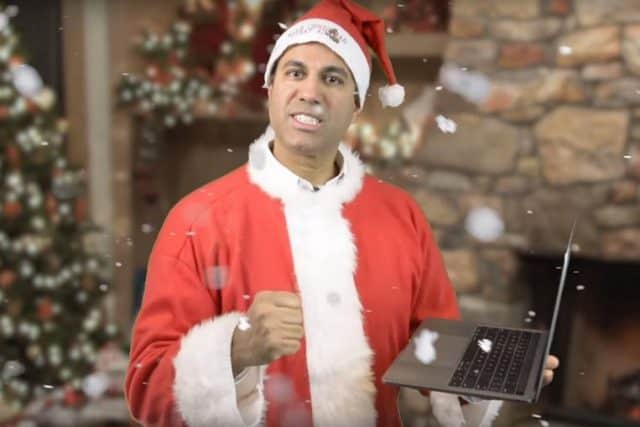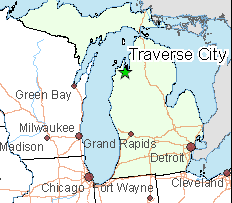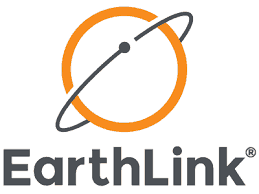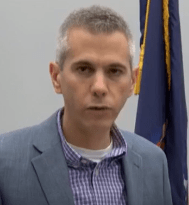
Santa Broadband: Ajit Pai’s magical world of broadband
God bless deregulation and your local phone and cable companies for making American Broadband Great Again.
That’s the message FCC Chairman Ajit Pai hopes will be the take away in the forthcoming 2019 Broadband Deployment Report — a highly dubious and over optimistic assessment of America’s rural broadband landscape.
“For the past two years, closing the digital divide has been the FCC’s top priority,” Chairman Pai said. “We’ve been tackling this problem by removing barriers to infrastructure investment, promoting competition, and providing efficient, effective support for rural broadband expansion through our Connect America Fund. This report shows that our approach is working. But we won’t rest until all Americans can have access to broadband and the 21st century opportunities it provides to communities everywhere.”
Except closing the rural-urban broadband gap has been a FCC priority for more than two years, and was a particularly high priority for the previous administration, which devoted a large amount of controversial stimulus funding after the Great Recession to internet expansion during the Obama Administration. In fact, Chairman Pai repeatedly claimed credit for broadband expansion projects that were funded by the previous administration, while at the same time criticizing the FCC under former Chairman Thomas Wheeler for harming investment in broadband with the enforcement of net neutrality.
The FCC continues to rely on dubious and flawed data to produce its reports — unverified data typically volunteered by the country’s phone and cable companies. The FCC has been frequently criticized for relying on inaccurate broadband availability maps, taking providers at their word on broadband speeds that fail to materialize in the real world, and reporting expansion projects that do not directly benefit consumers.
 Pai’s office this week released a press release attempting to conflate broadband gains to his deregulatory policies and the banishment of net neutrality.
Pai’s office this week released a press release attempting to conflate broadband gains to his deregulatory policies and the banishment of net neutrality.
“The private sector has responded to FCC reforms by deploying fiber to 5.9 million new homes in 2018, the largest number ever recorded. And overall, capital expenditures by broadband providers increased in 2017, reversing declines that occurred in both 2015 and 2016.”
But Pai does not offer any evidence to back up those claims. In fact, as Stop the Cap! has reported, many of the country’s largest telecom companies have been cutting capital expenditures, many initiated as part of system upgrades to convert to digital cable television or to increase the amount of fiber optics to increase cable system reliability — neither relevant to the debate about net neutrality. This year, Charter Communications has announced a dramatic drop in spending (despite the repeal of net neutrality) because their long-planned system upgrades surrounding the retirement of analog cable television are now complete. Charter also had its merger agreement with Time Warner Cable revoked in New York for failing to meet its rural broadband commitments in that state.
Comcast cut spending by 3% because it bought fewer set-top TV boxes in light of cord-cutting customer losses. Verizon, which has been aggressively promoting its forthcoming 5G millimeter wave wireless network, slashed spending from $17.2 billion in 2017 to between $16.6-17 billion last year, and a significant sum of that money was earmarked for 5G buildouts in urban areas, not expanding rural internet. AT&T’s capital expenditures for 2019 are not expected to move much, placed in the $23 billion range for 2019, just a little more than last year. But AT&T is expecting to be reimbursed $1.6 billion by the federal government for AT&T’s FirstNet public safety network buildout, and much of its other spending is targeting its wireless business, including a plan to launch 5G services in 19 cities this year. That means less money for AT&T’s wireline network, including fiber broadband for homes and businesses.
Pai’s claims about the increased availability of broadband, at higher speeds, comes largely at similar incremental rates to progress under the Obama Administration. In New York, which is seeking to approach near universal broadband coverage, what moved the needle the most was a large sum of funding available to subsidize rural broadband expansion. The availability of substantial financial assistance from the state government, which some described as corporate welfare, appeared to be the most effective broadband expansion motivator for an industry Pai praised in his press release, not deregulation or the repeal of net neutrality.


 Subscribe
Subscribe Stop the Cap! today appealed to New York’s Freedom of Information Law Officer to force Charter Spectrum to unredact customer complaint statistics on Charter Communication’s performance in New York since its 2016 merger with Time Warner Cable.
Stop the Cap! today appealed to New York’s Freedom of Information Law Officer to force Charter Spectrum to unredact customer complaint statistics on Charter Communication’s performance in New York since its 2016 merger with Time Warner Cable.


 Americans for Tax Reform’s leader Grover Norquist is continuing a campaign against municipally owned public broadband projects, labeling them “really stupid ideas” that are best left in the hands of private companies like Comcast, AT&T, Verizon and Charter.
Americans for Tax Reform’s leader Grover Norquist is continuing a campaign against municipally owned public broadband projects, labeling them “really stupid ideas” that are best left in the hands of private companies like Comcast, AT&T, Verizon and Charter.
 In the past, local officials have often been unprepared to deal with professionally-coordinated opposition efforts, but Traverse City officials are ready to deal with the opposition’s talking points, and have shared
In the past, local officials have often been unprepared to deal with professionally-coordinated opposition efforts, but Traverse City officials are ready to deal with the opposition’s talking points, and have shared  Windstream announced this week it was ditching EarthLink, the internet service provider it acquired in 2017 that has been around since the days of dial-up, in a $330 million cash deal.
Windstream announced this week it was ditching EarthLink, the internet service provider it acquired in 2017 that has been around since the days of dial-up, in a $330 million cash deal. As EarthLink’s balance sheet increasingly exposed the high wholesale cost of the company’s growing number of DSL and cable internet customers, executives calmed Wall Street with predictions that EarthLink’s wholesale costs would drop as networks matured and the costs to deploy DSL and cable internet declined. The phone and cable industry had other ideas.
As EarthLink’s balance sheet increasingly exposed the high wholesale cost of the company’s growing number of DSL and cable internet customers, executives calmed Wall Street with predictions that EarthLink’s wholesale costs would drop as networks matured and the costs to deploy DSL and cable internet declined. The phone and cable industry had other ideas.

